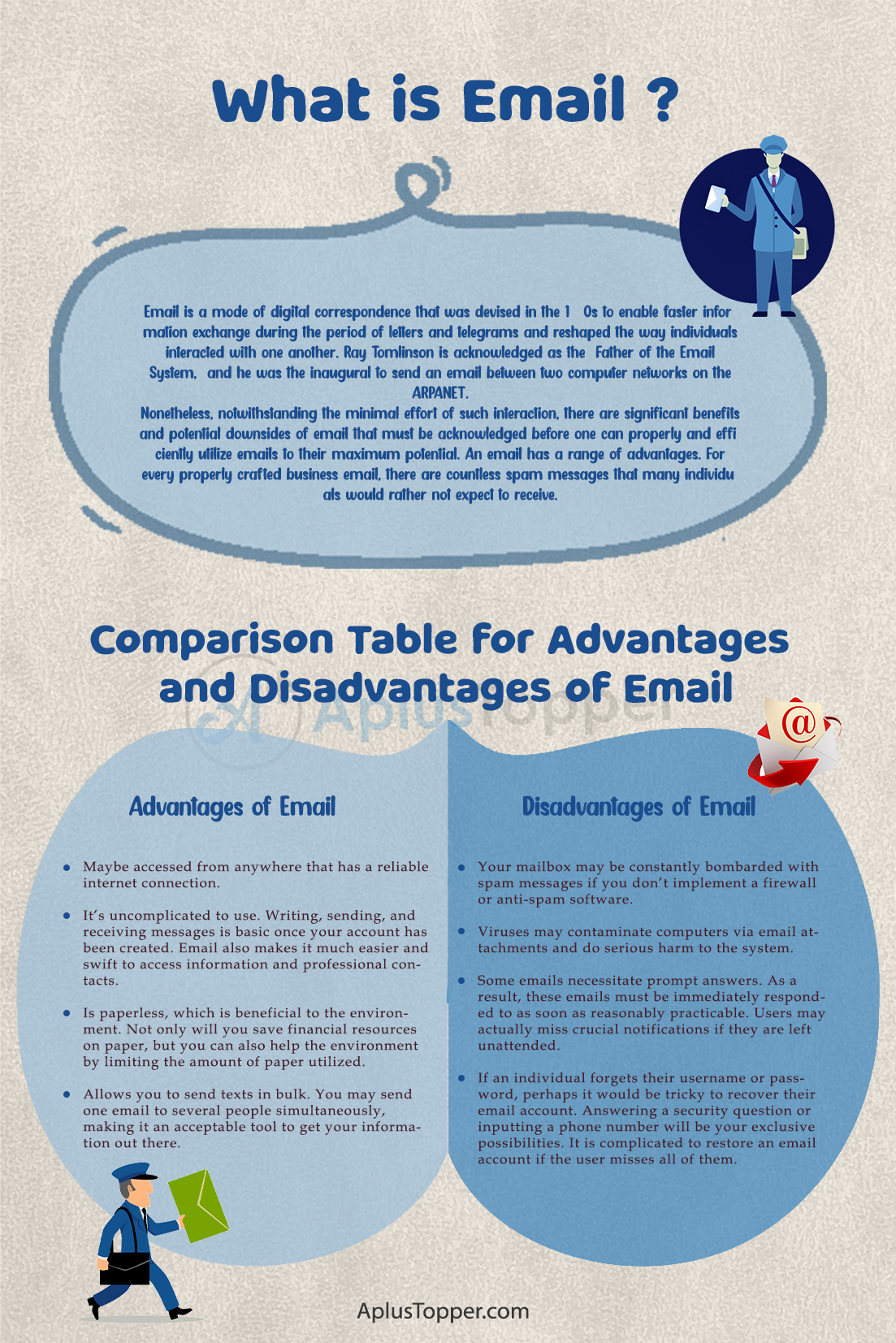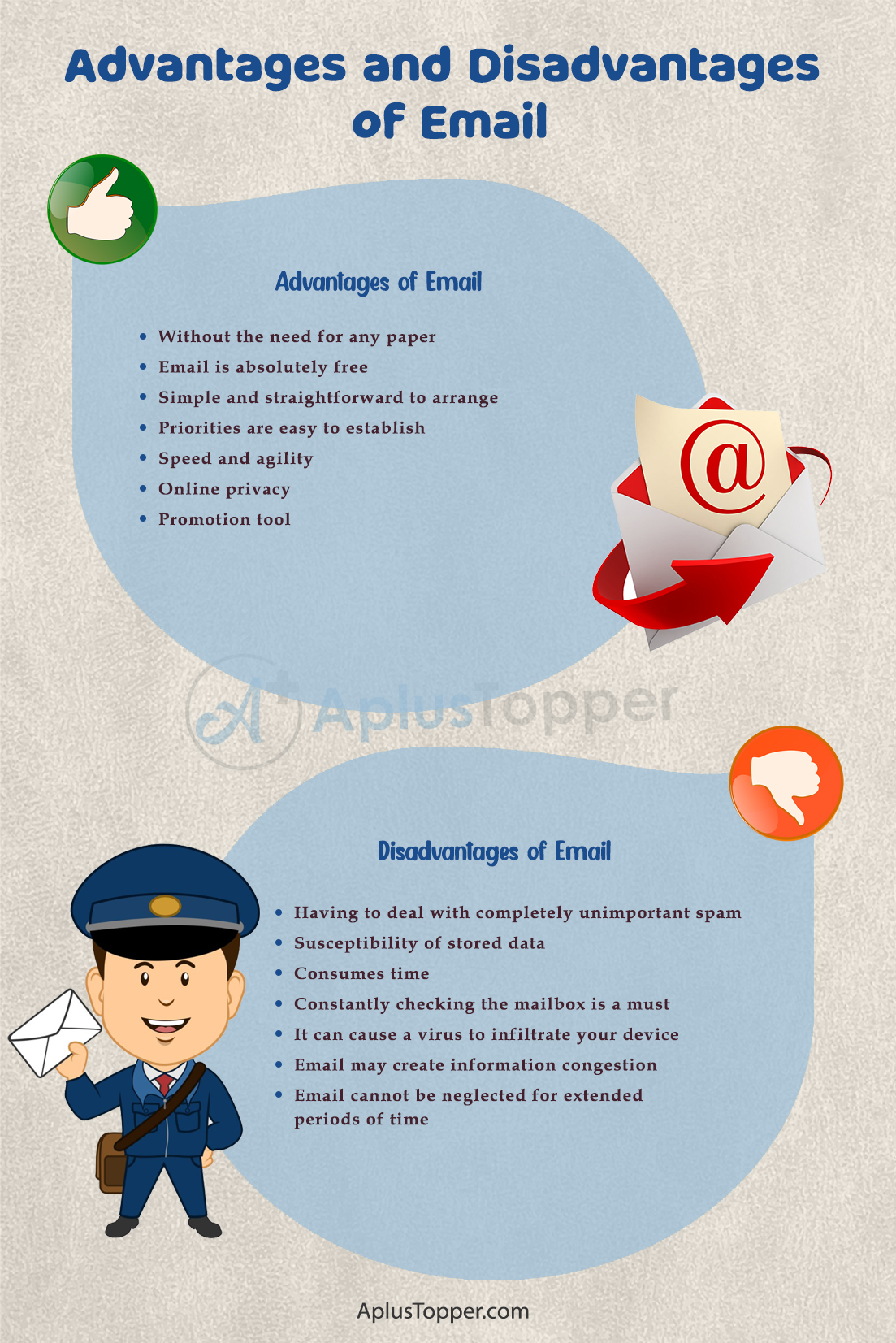Advantages and Disadvantages of Email | Using of Email Advantages and Disadvantages
Advantages and Disadvantages of Email: Communication is the gateway to the success of a business, and there are a few fundamental rules and guidelines while leveraging something as easy and accurate as email. As new technology is becoming more readily accessible and corporations continue to develop, an exponentially increasing range of companies and firms embrace email as their principal means of communicating instructions, data, and ideas.
An email has had pleasant implications on many people’s corporations. For many others, email is merely a temporary spamming line of attack that they prefer to avoid. There are pitfalls to email for every yield.
Students can also find more Advantages and Disadvantages articles on events, persons, sports, technology, and many more.
What is Email? Advantages and Disadvantages of Email 2021
Email is a mode of digital correspondence that was devised in the 1970s to enable faster information exchange during the period of letters and telegrams and reshaped the way individuals interacted with one another. Ray Tomlinson is acknowledged as the “Father of the Email System,” and he was the inaugural to send an email between two computer networks on the ARPANET.
Nonetheless, notwithstanding the minimal effort of such interaction, there are significant benefits and potential downsides of email that must be acknowledged before one can properly and efficiently utilize emails to their maximum potential. An email has a range of advantages. For every properly crafted business email, there are countless spam messages that many individuals would rather not expect to receive.
There are certain distinct benefits and drawbacks of adopting email in corporate communications. Knowing the positives and negatives of email can help you gauge how much energy you devote to using it.
- Advantages of Email
- Disadvantages of Email
- Comparison Table for Advantages and Disadvantages of Email
- FAQs on Pros and Cons of Email

Advantages of Email
- Without the need for any paper: The important strength of email that we can comprehend is that it is paperless. Instructions and performance bulletins can be communicated by email instead of drafting them on paper and sharing them. This makes the process simpler and more convenient with much less unnecessary stuff and is beneficial for the planet.
- Email is absolutely free: When contrasted to other communication platforms, email is effectively free. It is roughly comparable to fax, phone, and other courier solutions. Yet, no alternative is as cost-effective as email. There are definite commercial solutions that may cost you financial resources, but personal email is freely available anywhere and everywhere.
- Simple and straightforward to arrange: Messages and attachments sent and received may be managed strategically, systematically, and fairly reliably. Emails are much easier to assemble than hardcopy.
- Priorities are easy to establish: Incoming messages entail subject lines that potentially allow you to discard them even without reading them. It helps to save time that would otherwise be invested in examining each letter and ascertaining what it comprises.
- Speed and agility: An email can be sent to anyone out there at any moment and in a split second. That’s how incredibly swift email systems are. In a fraction of a second, anyone on the internet can get the email you posted. There is no other commercial delivery mechanism that really can operate this promptly. As a consequence, this also facilitates the company in adopting rapid strategic decisions.
- Online privacy: Since emails compensate for a significant chunk of most professional, meaningful conversations, such channels of language must be safeguarded in order to minimize information being leaked. Popular email servers spend a fortune to adequately protect their services from being compromised.
- Promotion tool: Distribute the exact email to as many recipients as you would like. Modifications are also clear and straightforward.
Disadvantages of Email
Although there is the minimal effort required in email for good communications, the shortcomings of email in corporate communication ought not to be blatantly disregarded. There are a few instances where it isn’t as useful or effective.
- Having to deal with completely unimportant spam: Do you know how many users have been deceived by spammers that send spam, mostly through email? Even if the bulk of spam emails eventually wind up in the Spam folder, there still is a risk you’ll get nabbed by spammers. Trying to deal with spam and junk mail is one of the most time-consuming aspects of the internet that one wants to avoid at all costs. Using emails poses this problem of continuous spam mails, which are always a source of irritation.
- Susceptibility of stored data: In terms of data, emails are quite insecure. Eliminating someone’s letters and printed emails consumes a lot of effort and time. However, the emails may be destroyed in a matter of a few minutes. Also, if the website goes out of business or goes down, the information on the server may be erased.
- Consumes time: While email is acknowledged for its near-instantaneous data transfer, it may also lead to serious time loss since most individuals would have to invest significant amounts of time filtering through emails from other departments. As one advances the career ladder, the scenario just becomes even worse.
- Constantly checking the mailbox is a must: To remain essentially informed, users must periodically check their inboxes.
- It can cause a virus to infiltrate your device: It is a malware source. It has the potential to damage a computer, gain access to the user’s email contact list, and send itself to a huge proportion of individuals around the world.
- Email may create information congestion: Some mails may be ignored or brushed aside, particularly if there are a substantial percentage of emails entering and the network has not enacted an email alert system on the working Devices.
- Email cannot be neglected for extended periods of time: This is because it requires regular management. If you overlook it, even more emails will accumulate in your inbox until it becomes completely unmanageable.

Comparison Table for Advantages and Disadvantages of Email
| Advantage | Disadvantage |
| maybe accessed from anywhere that has a reliable internet connection. | Your mailbox may be constantly bombarded with spam messages if you don’t implement a firewall or anti-spam software. |
| It’s uncomplicated to use. Writing, sending, and receiving messages is basic once your account has been created. Email also makes it much easier and swift to access information and professional contacts. | Viruses may contaminate computers via email attachments and do serious harm to the system. |
| is paperless, which is beneficial to the environment. Not only will you save financial resources on paper, but you can also help the environment by limiting the amount of paper utilized. | Some emails necessitate prompt answers. As a result, these emails must be immediately responded to as soon as reasonably practicable. Users may actually miss crucial notifications if they are left unattended. |
| allows you to send texts in bulk. You may send one email to several people simultaneously, making it an acceptable tool to get your information out there. | If an individual forgets their username or password, perhaps it would be tricky to recover their email account. Answering a security question or inputting a phone number will be your exclusive possibilities. It is complicated to restore an email account if the user misses all of them. |

FAQ’s on the Pros and Cons of Emails
Question 1.
Which is the fastest mode of interaction in the case of business?
Answer:
Email is the fastest mode of interaction as compared to fax, letters, and even, in that case, calls.
Question 2.
How can I get rid of spam emails that aren’t necessary or appropriate?
Answer:
Dealing with spams is always troublesome and time-consuming. Hence, Anti-spam software should always be used.
Question 3.
Is there a set of fonts that must be included in official emails?
Answer:
To ensure a certain degree of professionalism, the fonts used in official communications must have a respectable look. While some styles, such as Calibri, are popular and widely used, others are disapproved of. Overly frivolous typefaces, such as Comic Sans, tend to take the focus away from the message intended by the writer.
The post Advantages and Disadvantages of Email | Using of Email Advantages and Disadvantages appeared first on A Plus Topper.
from A Plus Topper
via Learning Made Simple 360
*Note that these contents are Autoblogged from A Plus Topper and cannot be edited.
Join the conversation